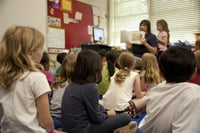TRENDING
International Day of Education: Why Should We Care About It?
- January 18, 2024
- In TRENDING
- 5 min read
Read on to find out more about The International Day of Education, what it is, who it affects, and why you and everyone you know should care about it…
Advice From a Teacher: How Can I Help My Child If They Fail Their Mock Exams?
If your child has failed their mock exams and is feeling overwhelmed, here's some advice from a teacher on how to support them the right way.
What Are Mock Exams and Why Are They Important?
With exam season fast approaching it’s key that your child gets things right in their mock exams. Let us guide you through this all important step.
Everyday Activities to Teach Your Child Financial Literacy
- April 3, 2023
- In TRENDING
- 8 min read
From investing to banking, and saving to budgeting skills, we need to step up and adopt everyday activities to teach our children financial literacy.
AI and the Future of Education
- April 3, 2023
- In TRENDING, Learning With Technology
- 9 min read
As a company that helps students learn with tailor-made tutoring in virtual classrooms, GoStudent seeks to understand how young people see education today. Join us and learn more!
Easter Arts and Crafts: Fantastic Ideas to Try at Home!
- March 24, 2023
- In TRENDING
- 6 min read
The holidays are fast-approaching and you’re fresh out of ideas. Fear not! We’re here to help you make some seasonal arts and crafts with your family!
Easter Activities for the Holidays: Keep the Kids Entertained Without Shelling Out
- March 24, 2023
- In TRENDING
- 6 min read
Looking for Easter activities to keep the kids entertained over the holidays? We’ve got it cracked with a selection of simple things to do in any weather!
Children’s Mental Health Week: Encourage Your Child to Connect With Others
- February 2, 2023
- In TRENDING
- 10 min read
Children’s mental health is a key focus for many of us. Here is our guide to the things you need to know about Children’s Mental Health Week…
The Best Secondary Schools in Edinburgh: A Helpful Guide
- December 13, 2022
- In TRENDING
- 10 min read
A helpful guide to the best secondary schools in Edinburgh, including how schools are ranked, Scottish league tables, and a list of the top schools.
Best Secondary Schools in Manchester
- December 13, 2022
- In TRENDING
- 14 min read
Want to know which are the top schools in your area? Find out with our comprehensive guide of the best secondary schools in Manchester 2022…
The Best Secondary Schools in Cardiff: An Up-to-date Guide
- November 25, 2022
- In TRENDING
- 8 min read
Choosing the best secondary school for your child can feel like a big task. We’ve put together all the key info for the best secondary schools in Cardiff.
Primary School League Tables: What Are They and Are They Useful?
- November 23, 2022
- In TRENDING
- 7 min read
As you start planning your child’s first step into education, you’ll want all the info you can get. Here’s our quick guide to primary school league tables.
Scotland School Holiday and Term Dates 2022
- November 22, 2022
- In TRENDING
- 7 min read
For parents, staying on top of when your child needs to be in school is key. Here’s our guide to term dates and school holidays for each of the 32 council areas in Scotland.
What Are the Best Christmas Money Saving Tips?
- November 22, 2022
- In TRENDING
- 5 min read
Trying to think of the best Christmas money saving tips? No need to break the bank this holiday season. Find out how to stick to your budget right here.
Get Your Diaries Out - Here Are the English School Term Dates 2022 and 2023
- November 21, 2022
- In TRENDING
- 14 min read
Get your diaries, calendars, and smartphones at the ready, here is a guide to the English school term and holiday dates for 2022/2023
















